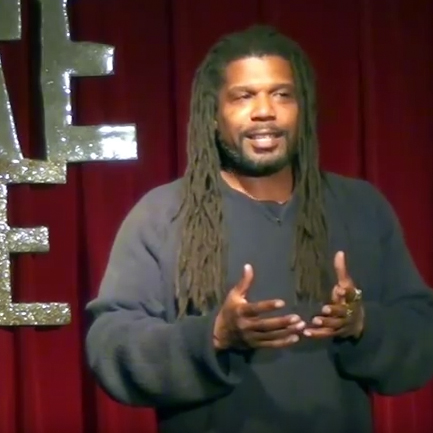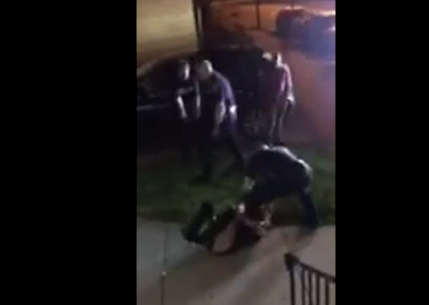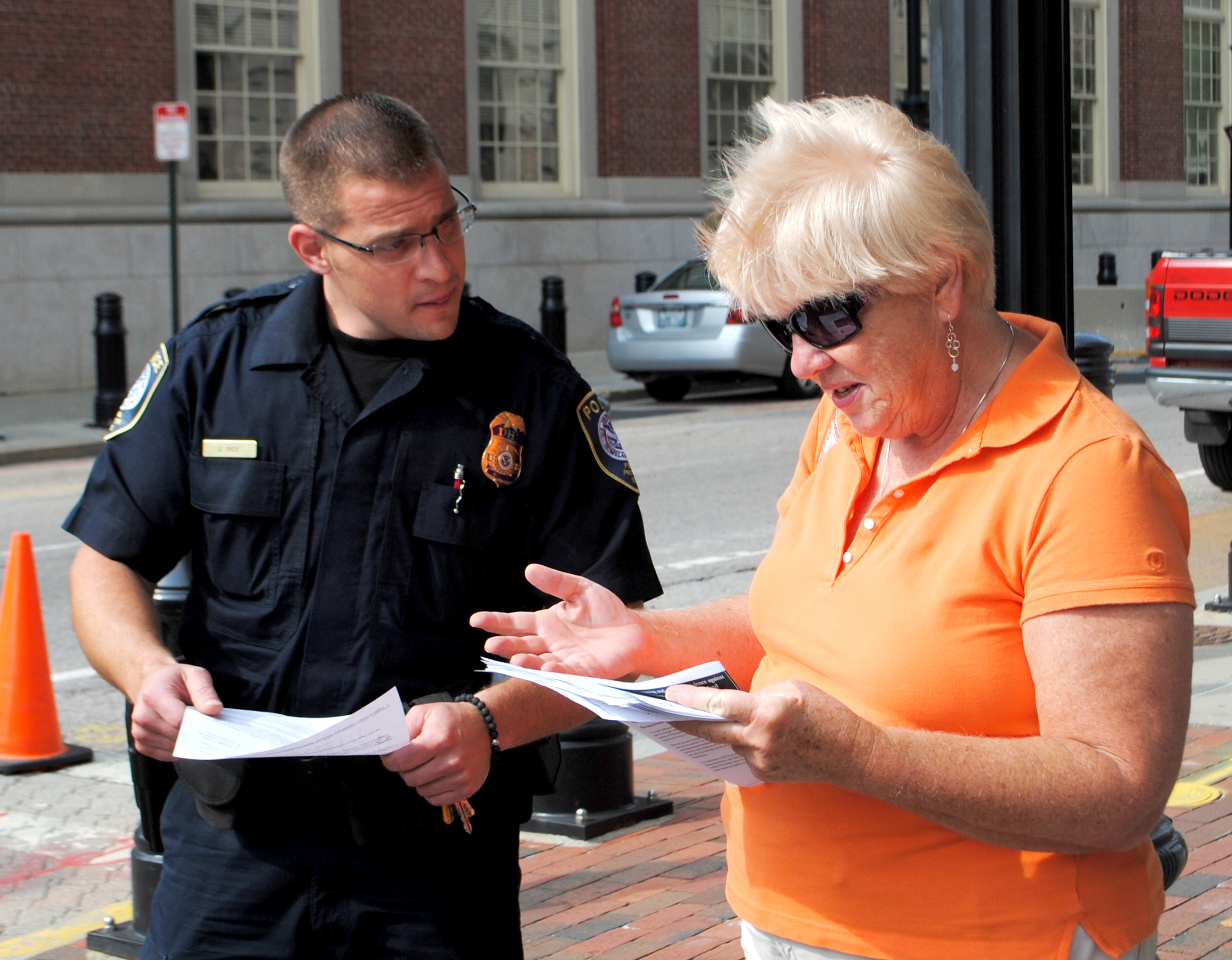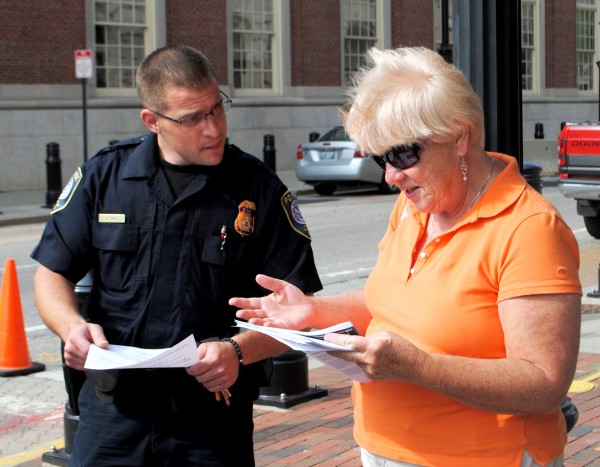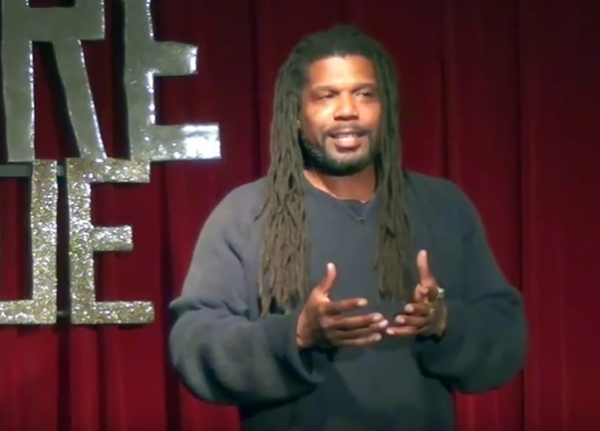
Providence poet Christopher Johnson was on the verge of a career capstone this May when he was interviewed by Governor Gina Raimondo’s office for the position of state poet laureate. But that same month he was also arrested by Providence police and charged with assault, resisting arrest and disorderly conduct. He’s concerned the arrest will hurt his chances of being named Rhode Island’s state poet. But the 45-year-old African American artist is even more concerned that his arrest was unlawful and racially motivated.
“I was definitely profiled,” Johnson said. “They had no reason to stop me except because I’m black.”
On May 18, Johnson went out with friends to listen to music in Providence. He was on hiatus from a nationwide spoken word tour about mass incarceration with the Everett Project. He’s recently performed at Trinity Repertory Theater as well as in Cincinnati, Ohio, Sedona, Arizona, Amherst, Massachusetts, among other locales. At about midnight, after what he called a “great evening with friends,” Johnson took the RIPTA bus back to his home in South Providence. That’s when he encountered Providence police officer Matthew Sheridan, whom Johnson said roughed him up – pushing him into a police car hard enough to dent it.
Johnson and a police report agree that he declined to give a police officer his name when asked. They disagree who first became combative.
“He grossly lied,” said Johnson of Sheridan. “That thing is filled with lies,” he said of the police report.
According to Johnson, “Because of the peculiar u-turn the officer made and the present climate of police/citizen relations across the country, I was on guard. I asked the officer why he wanted my name and he firmly made his request again. I told him if he does not give me a reason for the stop I do not have to give him my name. He exited his vehicle and blocked my path to my house. I tried to get around him and he grabbed me. I asked him if he was a public servant and if I was being detained. His reply was, ‘Why you got to go and do that?’ He grabbed me and threw me against the car.”
According to the police report, “in an attempt to check the well-being of the suspect [Sheridan] asked the subject who he was and where he was going. The suspect replied with ‘I don’t gotta tell you shit!’ It was at this time police stepped out of the vehicle and again asked the suspect where he was going the suspect this time pointed over Patrolman Sheridan’s shoulder and stated ‘over there’ Police asked what the exact address was to to which the unidentified male again stated “I don’t gotta tell you shit!” Police then asked the unidentified male to have a seat in the marked cruiser while police figured out where he lived. It was at this time the unidentified male pushed Patrolman Sheridan’s arm away and attempted to overpower Patrolman Sheridan. It was at this point Patrolman Sheridan took hold of the suspects arm and wrist and detained the suspect in the back of the marked cruiser.”
Johnson says he neither swore nor raised a hand to the officer. According to the police report, while being subdued by the officer, Johnson screamed “‘please don’t shoot me GOD don’t shoot me. the white cop is going to shoot me.'”
Providence Public Safety Commissioner Steven Pare said it can be difficult to ascertain exactly what happened after the fact, noting that body cams are ideal for such situations.
“The officer is going to have to articulate to the court why he asked this man his name and where he was going,” he said. “I don’t know what was in the officer’s mind when he asked.”
A person doesn’t necessarily have to give a police officer their name just because asked, according to Pare. But that doesn’t mean the officer can’t ask, even more than once. “A police officer can ask a thousand times,” he said. “You don’t necessarily have to answer. If you don’t answer, fine. But the officer can press. It’s subjective.”
Pare hasn’t discussed the incident with Sheridan because no complaint has been filed. Based on his reading of the incident report, Johnson “certainly had a right to continue on his way,” Pare said.
Johnson said Sheridan denied him that right. “I kept trying to walk past him,” he said.
PrYSM, the Providence Youth Student Movement, a local group that is organizing for Black Lives Matter efforts locally such as passing the Community Safety Act, said Officer Sheridan should be fired because this is the third controversial arrest he’s been involved with. Sheridan has been a Providence police officer since 2014.
“For over a year, we have been getting complaints about the violent behavior of this city employee,” said Steven Dy, organizing director of PrYSM’s Community Defense Project.
Sheridan has been involved in two previous violent and high profile arrests.
Earlier this year, Sheridan was caught on a security camera in a violent melee at a Providence nightclub for which he was disciplined. In that incident, reported by WPRI, discrepancies between Sheridan’s police report and security camera footage presented in court caused the judge to dismiss the charges, pending good behavior.
“He was formally disciplined and he was given retraining,” Pare said.
Sheridan was also on the scene when a woman was repeatedly punched by a Providence police officer recently. Pare said, Sheridan “was a responding officer and his role was minimal and he had no physical interaction with any of the defendants.”
Dy, of PrYSM, said Sheridan has a reputation “for terrorizing people, especially on Broad Street” and said the incident with Johnson was clearly racially-motivated, aggressive policing.
‘The moment they saw him they assumed he was a criminal,” he said. “If it was handled differently, the outcome would have been completely different.
Johnson is eager to put the incident behind him. He said he’s hopeful some good can come out of it. As state poet laureate, he said, he’d like to organize poetry slams with Black Lives Matter activists and police officers. “I’d like to get the police involved in the community,” he said.
Marie Aberger, a spokeswoman for Governor Raimondo, said the governor’s office doesn’t comment on nominees for poet laureate. But she did say an arrest wouldn’t prevent an appointment. “An arrest would not preclude someone from being named to the position,” she said. “We’d look at all the other experiences and qualifications for the position, along with the seriousness of the alleged offense, the circumstances surrounding it, and the outcome.”
Christopher Johnson performing at AS220’s Empire Review (video Steve Ahlquist):

